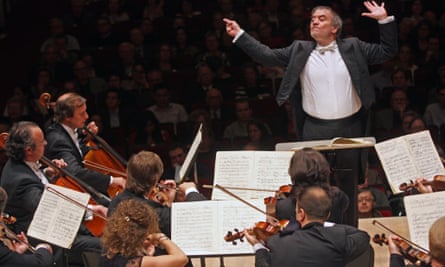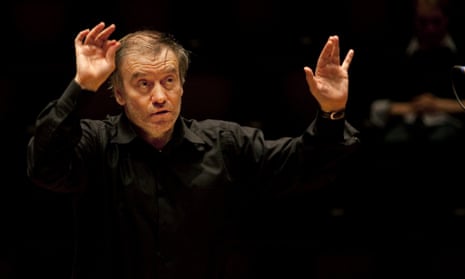Over the next 10 days Valery Gergiev will be conducting his final concerts as the London Symphony Orchestra’s principal conductor. It promises to be a distinctly low-key leave-taking; tributes to what he has achieved during his eight years at the helm have been conspicuous by their absence so far, and it seems unlikely that there will be the kind of fond farewell that many conductors receive when their tenures with an orchestra come to an end. It’s hard to avoid the conclusion that the LSO itself, as much as many of its regular audience, will be mightily relieved when Gergiev steps down from the Barbican podium for the last time.
Which is not to say that Gergiev is a bad conductor, far from it, but over the past decade and more he has consistently spread his considerable talent far too thinly, so that routine and sometimes under-prepared performances have been far too frequent, and his concerts with the LSO have included more than their fair share. When, in the 1990s, he first began to conduct the Mariinsky Opera (then still operating under its Soviet name of the Kirov) beyond its St Petersburg home, his impact on the international musical scene was immense. In St Petersburg he conducted the first stagings of Wagner’s Ring cycle and Parsifal since the revolution, while some of his performances in the UK with his company – Rimsky Korsakov operas at the Edinburgh festival, concert performances in London of Tchaikovsky’s Eugene Onegin, and more recently of Rubinstein’s The Demon – have been unforgettable. Very quickly Gergiev became one of the most sought after conductors in the world, so that his professional life seemed to become a tireless whirl of jet-setting engagements.

Flashes of that old, irresistible flair and energy still sometimes come through in his performances, most often when he is back conducting Russian repertoire with the Mariinsky singers and players who know him so well. But even in 2005, when it was announced that he would be taking over the LSO from Colin Davis in two years’ time, there was scepticism that a conductor who never seemed to stay in one city longer than it took for a final rehearsal and then the concert itself, would really do the careful, responsible job that one of the UK’s leading orchestras required to maintain its standards.
Gergiev was appointed to the LSO by its then managing director Clive Gillinson, not long before he left to run Carnegie Hall in New York. The deal was done and dusted by the time Gillinson’s successor Kathryn McDowell took over, though she was later responsible for extending that initial contract through to this autumn, at a time when Gergiev’s tenure with the orchestra must have already seemed less than a total success to say the least, and questions were being asked about his dubious connections with the Putin regime.
The fact remains that the LSO has had Gergiev as its figurehead for eight years, and in that period it has very rarely experienced the inspirational best of him on the podium, or received the close attention, what you might call the pastoral care, that a really diligent chief conductor can bring to an orchestra’s culture of concert-giving. At times during that period, the sound of the orchestra, in its home at the Barbican especially, was coarse and unpleasant. Gergiev, one could only assume, liked loud and liked his performances to have a brassy glare (though the Mariinsky Orchestra rarely sounds like that), and the LSO never seems to need much encouragement to play in that manner.
Very few of his performances with the orchestra have lodged in the memory in the way that over the years so many with the Mariinsky have done, and the composer-themed series – Mahler, Brahms and Szymanowski, Berlioz – far too many of them assiduously documented for posterity on the LSO’s own CD label, have often seemed like featureless mediocrity. It may be that eventually Gergiev will be recognised as the great Russian conductor he promised to become 20 years ago, perhaps the best since Yevgeny Mravinsky; if that’s the case, though, it’s very unlikely his eight years with the LSO will have played a significant part in establishing that reputation, and that’s a shame.

